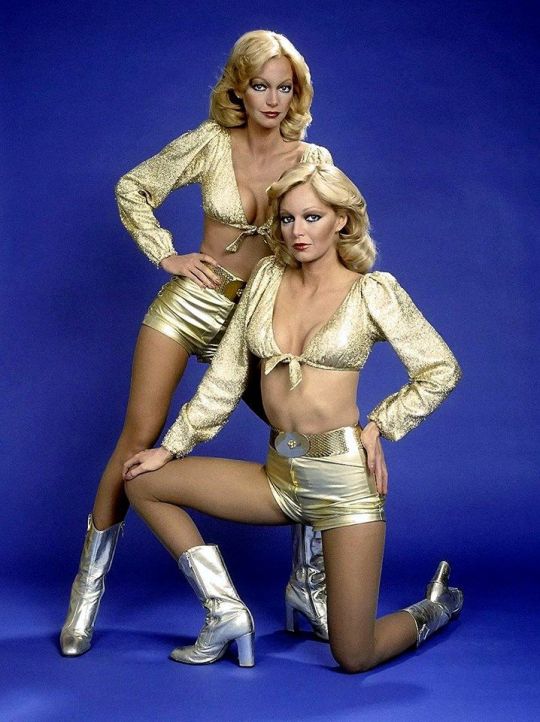#patricia barnstable
Text


Patricia Barnstable and Cyb Barnstable - Quark (1978)
#quark gif#barnstable twins gif#patricia barnstable#cyb barnstable#70s sci-fi#70s tv series#sci-fi comedy#the bettys#seventies#1978#gif#chronoscaph gif
855 notes
·
View notes
Text

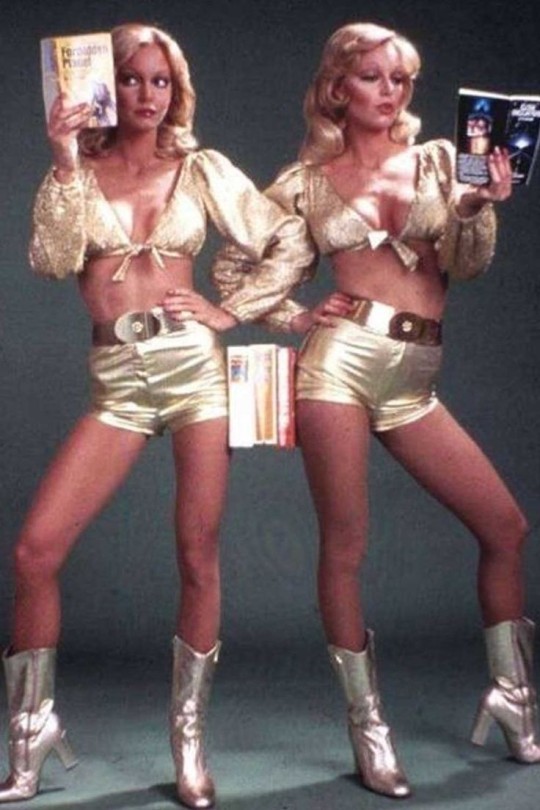
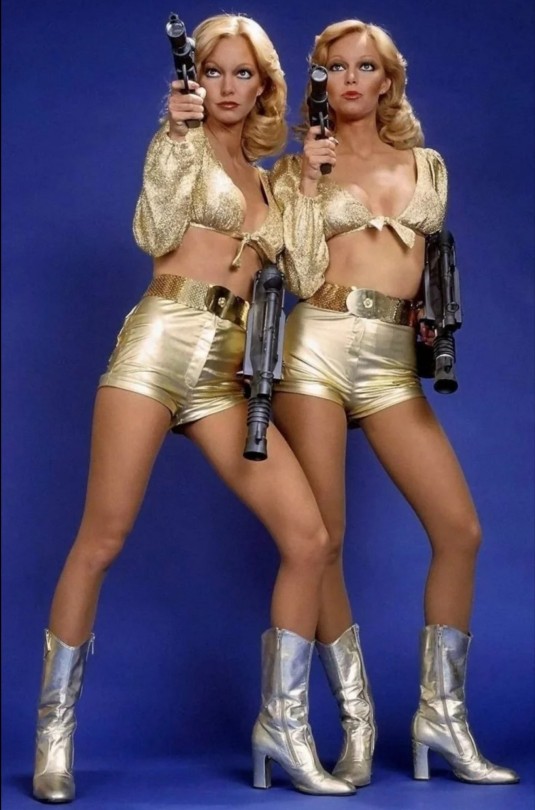

Patricia and Cyb Barnstable as Betty 1 and Betty 2 on/for NBC tv show "Quark" (1977)
#patricia barnstable#cyd barnstable#quark (1977)#comedy#sci fi#science fiction#70s#1970s#late 70s#70s sci fi#70s science fiction#space babes#blondes#identical twins
4 notes
·
View notes
Text
In, 2226 AD, Adam Quark works as a galactic space garbage collector but dreams of more glorious assignments. He and the crew live on the space station Perma One. Space travel is common, the universe is mixed with aliens, and android technology exists. (Quark, TV)
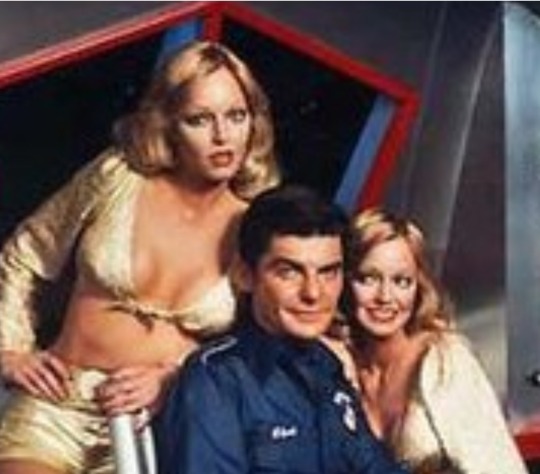
#nerds yearbook#sci fi tv#2226#quark#adam quark#space station#space ship#perma one#richard benjamin#buck henry#tim thomerson#patricia barnstable#cyb barnstable#conrad janis#palindrome#alan caillou#the head#robot#bobby porter#richard kelton#joan van ark#princess libido#ross martin#zorgon the malevolent#ned york#bar-tel#jerrold ziman#professor dinsmore#douglas fowley#dr. o.b. mudd
6 notes
·
View notes
Photo
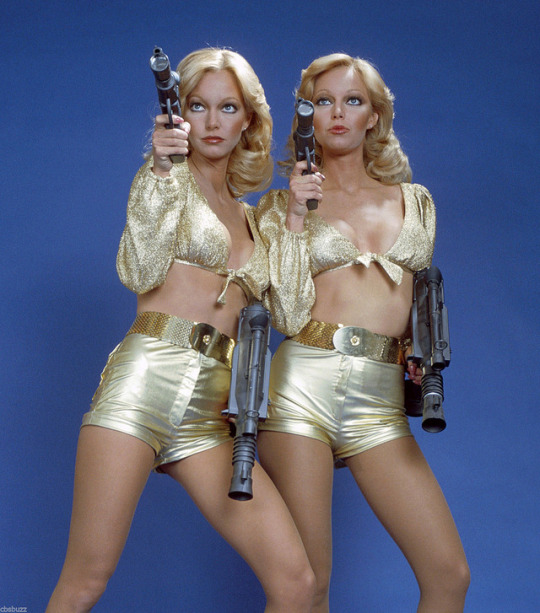
Patricia and Cyd Barnstable as Betty from the TV series Quark, 1977-78.
141 notes
·
View notes
Text
Happy 70th Birthday to The Barnstable Twins
Happy 70th Birthday to The Barnstable Twins
Patricia “Tricia” and Priscilla “Cyb” Barnstable are a pair of identical twin actress/models from Louisville, Kentucky, born May 23, 1951. They are the daughters of ciollege basketball star Dale Barnstable (1925-2019), who was banned from the NBA for life as a result of the 1951 point shaving scandal. Quite a roller coaster year for that guy! Fortunately, his daughters grew up to do him proud,…

View On WordPress
4 notes
·
View notes
Photo

Cyb and Patricia Barnstable as Betty I & II on Quark (1977)
53 notes
·
View notes
Photo
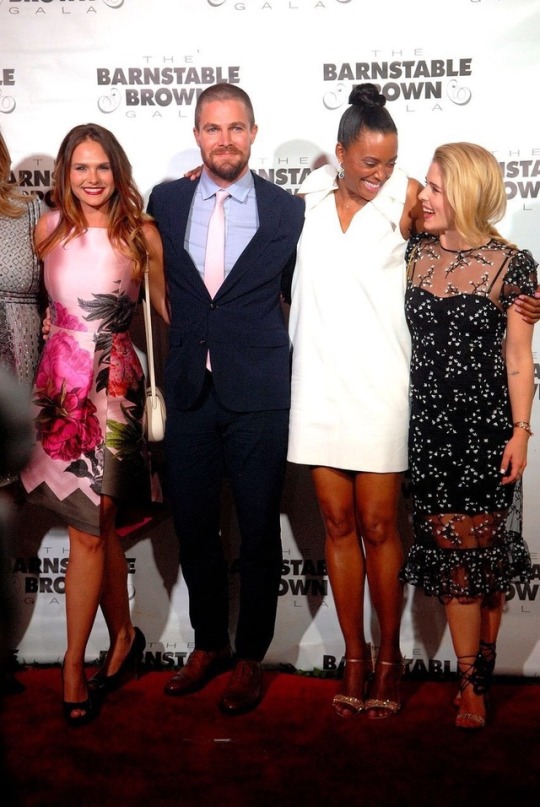
@StephenAmell
We had the best time at the Barnstable Brown Gala. Thank you to Patricia again! And now please check out this terrific photo of @cadlymack —
https://twitter.com/StephenAmell/status/993529956608065536
15 notes
·
View notes
Text
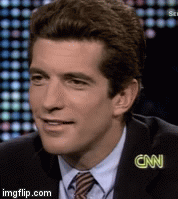
Full Name: Christopher James Elbridge III
Height: 6'1''
Eye/Hair Color: Brown / Dark Brown
Nickname: Chris, Elbridge, Christopher James Andrew Elbridge ( usually used by Colleen if she's highly irritated about something )
DOB: October 11, 1964
POB: Barnstable MA
Hometown: Hyannis Port, Massachusetts
Parents: Christopher James Elbridge II ( referred to as CJ ) and Patricia ‘Tippy’ Anne Avery- Elbridge
Siblings: William Bradley Elbridge & Katherine Avery Anne Elbridge { both younger }
Significant Other: Colleen M. Hudson { wife/fiancé }
Children: Jonathan James Flynn Elbridge ( called Jack ) , Rosemary Kathleen Elbridge ( called Rosie )
Friends:
Benjamin Chase ( from his NYU Law days )
Jack Flannery ( also from NYU )
Helene Starling ( through Colleen and the only other woman he’ll trust besides his wife, sister and mother )
Schooling:
Hyannis West Elementary ( K - 8th grade )
McCavish Academy ( 9th - 12th grade )
Brown University ( graduated with a Bachelors degree. Majored in Political Science Minored in Education )
New York University of Law { earned a JD in ‘88 and passed the state Bar exams in both New York and Massachusetts on his first try }
Occupation:
Currently works as the deputy director of his uncle’s grass roots foundation, Pushing Forward, a non profit organization that provides help services to those with disabilities.
- Associate at Chase Thiel & Faulkner { Formerly } * he still occasionally offers his services for pro bono cases
Favorite Song(s): Chimes of Freedom - Bob Dylan, Helplessly Hoping - Crosby Stills and Nash, In The House of Stone and Light - Martin Page, literally anything by U2 and Van Morrison
Anniversary: July 22, 1990
Hobbies: Boating, swimming, hiking and running
Herbs: Ginger / Echinacea / Passionflower
MBTI: INFP
Star sign: Libra
Pets:
One dog ( a mix named Mooch )
one cat ( named Bugsy )
two goldfish ( named Ariel and Sebastian - both won at the ping pong ball toss at the local carnival for Jack and Rosie )
Fast Facts:
- On the day he planned on proposing to Colleen he was mugged. He lost not only his wallet but the ring he'd had made for her and oddly enough his favorite pair of shoes.
- Broke his arm jet skiing while on his honeymoon. ( that was an interesting experience to say the least )
- Contrary to popular belief he actually does not have a trust fund, none of his siblings do. Their parents raised them to be self sufficient people but they did pay for each of them to go to college. Despite the money that the family has it isn't flaunted.
- He can ski he just can't ski well.
- His first job during high school was working as a stocker/bag boy for the local Shaw's. He ended up putting it into a savings account.
- His ideal meal is a lobster roll and a beer ( but shh don't tell Colleen, she's been trying to get him to eat a little healthier. )
- Is an avid Red Sox and Bruins fan.
- He regularly bikes to work. He only drives in if it's snowing or downright pouring.
Most Embarrassing Moment:
Over the years he's had many and it changes if you ask him to name one off the top of his head. Right now he'd tell you that it was at the annual Christmas party when he'd had one too many glasses of egg nog and decided that it might have been a great idea to launch himself at the family Christmas tree much like a cat in a tacky Christmas sweater and a Santa hat. Colleen got it on video and his mother managed to take photos.
0 notes
Text
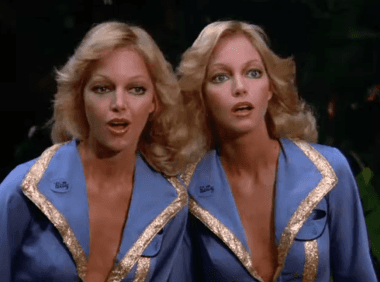
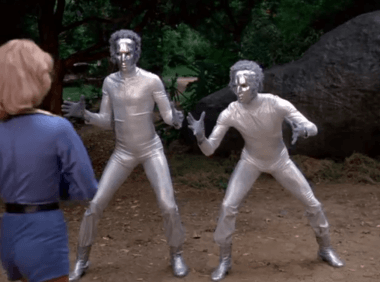
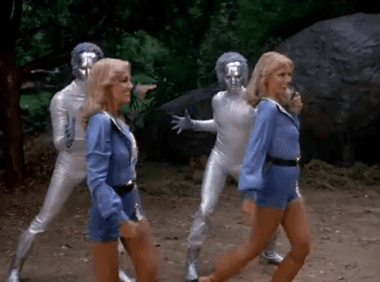
Patricia Barnstable and Cyb Barnstable - Quark (1978)
#quark gif#barnstable twins gif#patricia barnstable#cyb barnstable#70s sci-fi#sci-fi comedy#space dance#the bettys#buck henry#goodbye polumbus#70s tv series#seventies#1978#gif#chronoscaph gif
390 notes
·
View notes
Photo

Patricia and Syd Barnstable from “Quark” (1977)
367 notes
·
View notes
Text
Cyb and Patricia Barnstable #backintheday pic.twitter.com/KhxrnSkRXq
— Sluts and Guts (@sluts_guts) January 10, 2020
Cyb and Patricia Barnstable #backintheday https://t.co/KhxrnSkRXq
View On Twitter!
0 notes
Link
BARNSTABLE — The foreclosure auction of an East Falmouth house was pushed back after a hearing on a restraining order sought by the town of Falmouth against Citibank was postponed.Town Counsel Patricia Harris and Citibank attorney Christine Kingston appeared at the Barnstable Superior Court hearing Friday, but homeowner and co-defendant Jamie Pearson did not.Harris said Pearson was served with notice of the hearing, but the process server paperwork was not correctly [...]
0 notes
Text
Retired Cape doctor named to national panel on tick-borne illness
Sam Donta treated thousands of individuals such as Lyme disease.
Cynthia McCormick @Cmccormickcct
FALMOUTH — An infectious-disease expert from Falmouth having a long history of treating patients with Lyme disease was appointed to a national subcommittee analyzing tick-borne illness.
Dr. Sam T. Donta was one of 53 people delegated this month to serve on six subcommittees of their Tick-Borne Infection Working Group, which is charged with advising the U.S. secretary of Health and Human Services on the future direction of tick disease therapy and research.
“The mission is to determine what needs to be done to additional progress the diagnosis” and therapy of Lyme disease and other tick-borne illnesses, Donta explained.
“The fundamental theme is people’s continuing symptoms,” Donta, 79, said.
The first stage of Lyme disease transmitted by the bite of the black-legged deer tick comprises fatigue, flulike symptoms and a rash.
But it’s later symptoms of the bacterial illness that individuals say mess lives because they influence cognition, vision, joints, tendons as well as the heart.
The ideal treatment for chronic, late-stage or relapsing Lyme disease continues to be a medical governmental football, as some infectious-disease experts such as Donta espouse the usage of long-term antibiotics while other doctors decry their usage and say there is no proof of lingering infection.
“Some progress is being made. More have to be produced,” stated Donta, That Has Been affiliated with Boston University and the University of Connecticut Health Center in Farmington.
“Patients have persisting symptoms,” Donta explained.
Donta, who retired in 2015, estimates that he has treated at least 8,000 people from the Cape and beyond since 2003.
He is working on the Pathogenesis, Transmission and Therapy subcommittee of their Tick-Borne Diseases Working Group together with such luminaries as Dr. Brian Fallon of Columbia University’s Lyme and Tick-Borne Diseases Research Center, along with Dr. Patricia K. Coyle, neurologist in Stony Brook University Medical Center.
The working class was formally launched in August as a result of the 21st Century Cures Act enacted by Congress from 2016 to examine an assortment of health issues such as opioid addiction and behavioral health.
Critics of the action point to its service by leading pharmaceutical companies and wonder its advocacy of patients and consumers.
Among the working class subcommittees concentrates on vaccines and therapeutics while others examine surveillance, diagnostics and accessibility to care.
The working class is scheduled to make a record to the Health and Human Services secretary in December and then every two years after that.
The Tick-Borne Infection Working Group is led by Dr. John N. Aucott of the Johns Hopkins University School of Medicine and contains Charles Benjamin Beard, a Master in bacterial infections with the Centers for Disease Control and Prevention.
Donta, who stated he serves to the U.S. Army Medical Research Tick-Borne Disease Programmatic Panel Beard, stated Beard “knows there’s a issue and wants something done”
Donta also serves to the Barnstable County Lyme/Tickborne Diseases Task Force.
The Centers for Disease Control estimates that there are 300,000 new cases of Lyme disease every year. The number of additional tick-borne diseases is also on the upswing.
Over the Cape, folks are sickened by bacterial tick-borne disorders babesiosis, anaplasmosis and miyamotoi, and past year at two Cape guys died from the tick-borne Powassan virus.
Lisa Freeman, a registered nurse who set on the Cape Lyme Advocacy Service Program, stated Donta brings a wealth of knowledge to talks about Lyme in the federal level.
“I really hope they can see that really is a chronic issue that needs more focus,” Freeman said.
— Practice Cynthia McCormick on Twitter: @Cmccormickcct.
from Health http://www.hospicels.org/retired-cape-doctor-named-to-national-panel-on-tick-borne-illness/
0 notes
Text
The bloodlines of America run through the Kentucky Derby
48 hours inside the gates of America's most famous horse race
I’m in the beach and swimwear section of the basement-level T.J. Maxx on Wall Street in New York City and I’m frantic. I’m going to Kentucky tomorrow for the Derby, a strange Southern party that has always fascinated me, a Yankee from New England.
“Do you have a hat?” my editor asked me earlier today, and I realized I expected one to magically appear when I got to Louisville. That’s clearly not how things work, so here I am, trying to decide between the lesser of two straw evils. I send a picture of each to my mother. She tells me to buy the white one because the black one makes me look like I’m going to a funeral.
The next morning I get on a plane, cross several state lines, and land in the pouring rain among the lush green hills and steel gray rivers of Louisville.
Two women, who I assume are from some sort of tourism department, greet arriving passengers at the gate. Their hats match their red, rose-printed dresses, and I marvel at the feathers and curlicues cascading out from their brims.
My hat is crushed in my bag.
“I had a bunch of girls from Vanderbilt in the car wearing ponchos before you, so it smells like flowers and plastic,” says my Uber driver named Randy. We’re driving through the rain, passing boarded-up houses that surround Churchill Downs.
I’m on my way to the Oaks, the set of races held the Friday before the Kentucky Derby. Everything we pass is gray, except for the blinking red and blue lights of a police cruiser and the yellow caution tape marking off a crime scene next to it. There’s a big heroin problem in the neighborhood around Churchill Downs, Randy says. Homicides have been on the rise, too.
Inside the track, the white-washed tunnels feel like a mix of a country club and the concourse of a baseball stadium. It smells like cigars, beer, and a front yard after a heavy rain.
Everything here is pink, from people’s outfits to the banners hanging from the painted rafters. It’s Filly Day, and some of the proceeds go to breast cancer research. I didn’t realize Filly Day was a thing, so I’m wearing a black dress, my stupid hat, and black toenail polish. If anyone asks, I’ll just say I’m from New York.
The people in lines inch closer to the betting windows or booze vendors as they wait to bet or buy what’s probably their thirteenth mint julep or aluminum bottle of Bud Light. They look miserable. They should be miserable, because a steady drizzle alternates with downpours, and everyone is dressed for what they want the weather to be. Women stick it out in sundresses and rompers, bearing their shoulders, midriffs, knees. The cuffs of men’s seersucker pants are caked with mud, their sleeves wet. They’re playing pretend, wearing costumes and acting like they enjoy shivering on a 45-degree day.
A damp cold has settled into my bones, numbing my toes, tensing up the muscles in my shoulders and the back of my neck. I want to leave, but I haven’t seen a horse race yet. I’ve never seen a horse race, so as the bugle blows, I go down to the rail by the track and hold onto the wet metal.
The gates open and the race starts on the opposite side. I watch the Jumbotron set up in the infield, an open cage for drunk people which is slightly cheaper ($90) than the cheap seats in the grandstands ($175). Suddenly the horses, the purest manifestation of bloodlines, the embodiment of animal eugenics, round the corner and go from screen to flesh.
Their hooves spin through the track, which looks like frosting on a cake that’s been left out in the sun. Mud spatters the horses’ flanks and creeps up the jockeys’ legs, whose silks haven’t changed in 150 years. The jockeys strike the backsides of the beasts with riding crops.
I strain against the rail, speed and strength hurtling through my chest. I didn’t expect the race to be so visceral, to be so overwhelmed, for the horses to run right through me. I feel like someone knocked the wind out of my lungs.
What I can’t feel is my entire left foot at this point, and I’m having trouble typing notes on my phone because my fingers are so stiff with cold, so I leave. Outside the gates, I have to step through an obstacle course of soggy horse race trash that covers the stone entrance: shattered mint julep glasses, soaked betting books, cigarette butts, the runoff of American vices. It looks like a hangover.
In the middle of all of it, there’s a guy selling red t-shirts. He holds one up, and yells out the slogan stamped across the front: “Donald Fucking Trump,” he cries. “Donald Fucking Trump!”
I’m at the Barnstable Brown Gala on Friday night standing three feet away from Tom Brady. A barricade of folding chairs separates me from the football god as he holds court. His teammates Danny Amendola and Jimmy Garoppolo sit on one side of him, and an old guy I don’t recognize sits on the other.
A muscled man in a suit and a flat-billed Navy hat — clearly Brady’s Guy — swats away people wearing sparkling evening gowns and crisp tuxedos. They keep trying to sneak through the makeshift guardrail of seats. He firmly tells them, in a pronounced Boston accent, to stop.
Stahhhhp.
Brady’s Guy is raising his voice at one particularly adamant woman when all of a sudden I hear the sound of splintering wood and look over to see Brady’s chair spontaneously collapse, sending him crashing to the floor. There’s a collective gasp as Brady’s Guy springs to the quarterback’s side to help him up. Brady looks stunned at first, then starts to laugh. He stands up and brushes himself off.
“Was this your chair?” he jokes to another suited man. Brady grins. “Sorry I broke it.”
The surrounding crowd breaks out into relieved laughter.
The Gala is an annual event that the Barnstable-Brown family hosts the night before the Derby. There might not be official aristocrats in America, but if there were, the Browns would qualify. They’re the Kentucky Browns, as in Brown-Forman, as in one of the largest publicly traded companies in the spirits and wine business.
Patricia Barnstable, who was of the Doublemint twins (along with her sister Priscilla), married into the family when she wed David Brown. They started hosting this party at their home on Spring Drive 29 years ago to raise money for diabetes research. So far, they’ve donated more than $13 million to the Barnstable Brown Diabetes and Obesity Research Center at the University of Kentucky.
Sadly and ironically, David developed diabetes and died of complications in 2003. So now Patricia, her mother Wilma, and her and David’s son Chris Barnstable Brown — a lawyer and football writer who lives in New York City — organize and run the party. They don’t hire a PR firm because stars like Peyton Manning, Jeff Bridges, Brady, and Katie Couric know that if you’re going to the Derby, you can’t miss this. Patricia handles all the celebrities; Wilma sells each of the 1,200 or so tickets over the phone herself.
People are lined up along the rainy street outside the gates to watch the celebrities show up. The fans scream out names (“IT’S JOEY FATONE!!!”) as the party busses unload. They call horse racing the sport of kings, so it’s fitting that American royalty — the ones who grace the pages of the tabloids I browsed while I waited in the checkout line at T.J. Maxx — show out for it.
This party is a weird and wonderful pocket of Chris Barnstable Brown’s life, a yearly pilgrimage to pay homage to his roots. He recalls how, when he was ten years old, he danced in his backyard with Brooke Shields at the party. How his father used to shake the hand of every single guest who came through the wrought iron gates on either side of his driveway.
Which is why he’s still standing outside in the cold drizzle, two hours after the party started: to carry on his father’s tradition. From my perch on a riser in the press pen beside the red carpet area, I watch him shake the hand of each bedazzling star, moneyed Kentuckian, and guest of a guest who enters his family’s home.
Photo by author
Jesse Eisenberg poses awkwardly. Richie Sambora slides in and does a jazz hands pose. A bunch of famous people I don’t know — but who are apparently a big deal from some superhero TV show — put their arms around each other. Jeff Bridges and his wife are as sexy as you want them to be in real life; Jason Witten’s hair is thinning. Tracy Morgan jokes with the local newscasters. The cast of Vanderpump Rules, a reality show about bartenders at a Los Angeles restaurant, preen. New money oozes from their pores.
I shed my raincoat, hide it behind a catering table, and go back to the party in my evening dress and heels. The woman guarding the VIP section nods and pulls a rope aside when I flash my media badge, and I make my way up the sloping hill to the tent where I can see Aaron Rodgers, Randall Cobb, Jimmy Garoppolo, Bode Miller, Rickie Fowler, and Justin Rose hanging out.
Rodgers stands by himself away from his teammates. He’s facing the stage, where someone — maybe country singer Travis Tritt, but I can’t remember, and that seems unlikely — is covering a Ben Harper song. I introduce myself. We stand there listening together.
“Do you play an instrument?” I ask.
“Yeah, I play the guitar,” Rodgers says. “I love this song.”
“I just went to a Ben Harper concert a few weeks ago,” I say. “He played with his daughter. It was pretty cool.”
Rodgers lights up. “Really?” He says. “Ben is the reason I play. I sent him a signed jersey after I saw him in concert, and he sent me back a guitar. Can you believe that? He sent me a guitar!”
“Whoah, you should send more musicians signed jerseys,” I tell him. “You’d probably have way more guitars by now if you did that.”
“Maybe you’re right,” Rodgers says.
I get the sense that he wouldn’t mind being left alone, so I leave him alone. People keep coming up to take selfies with him. He obliges, always gracious, but you can tell it’s exhausting. A few tables away, Brady — who’s secured a sturdier chair — is dealing with the same thing. This is their price of admission.
“Aaron hates this shit,” says Eric Bakhtiari, ex-NFL player and brother of Packers tackle David Bakhtiari, looking over at Rodgers. “Normally, you know who I let through? Veterans and attractive women. My brother guards Aaron on the field, I guard my brother off it.”
He pauses and turns back to me. “You can use that in your story, it’s my gift to you.”
It’s now midnight, and Kid Rock — who was recently photographed in the Oval Office with President Donald Trump and Sarah Palin — is rapping. The Packers circle up and decide it’s time to go. So do the Patriots.
I watch Julian Edelman embrace Brady, then embrace Garoppolo, and then grab a bottle of water off the table and chug it in under thirty seconds. Both crews of players get whisked away by men in suits. Our new American thoroughbreds are paraded through the crowd like horses in the paddock before the Derby.
Kentucky has so far felt like an acid trip you’d have while reading US Weekly, a prep school semi-formal, and a frat party during a monsoon. Parts of Louisville I pass going in and out of the track are so bleak, but the trappings of the Derby are so bright. A huge swath of history seems missing, like someone’s painted over a wall without stripping it first.
Photo by author
Shirley Mae Beard at Shirley Mae’s Cafe and Bar
I go searching for what it is and head over to Shirley Mae’s Cafe and Bar, where a Clinton/Kaine sign still hangs on the iron bars of the front door. Carrying my hat in my hand and shivering in my sundress and raincoat, I push it open to enter an empty front room with a few tables and a well-stocked bar. It’s dimly lit and humid in here; the bar feels sticky and soft. You could carve your initials into it using only a fingernail.
Pictures of celebrities posing with Shirley Mae Beard, the owner, hang behind the bourbon bottles. I see Whoopi Goldberg, Hillary Clinton, B.B. King, Morgan Freeman. That famous picture of Clinton wearing sunglasses and looking at her cell phone hangs on the wall, blown up to the size of a poster.
Shirley Mae’s daughter Dee Simpson comes out from the kitchen. She’s wearing a shirt that says, I’M NOT ARGUING, I’M JUST TELLING YOU WHY I’M RIGHT, and has very short graying hair that she’s growing out after rounds of chemo. Three months ago doctors finally declared her cured of uterine cancer, but she says being cancer-free is like being in AA — you go day-by-day, month-by-month. Shirley Mae and her shock of white hair shuffle around behind the counter, stirring the contents of pots and poking at frying chicken.
“Oh, look at you, you got your hat and everything!” Dee says. She smiles, and her eyes crinkle in a way that gives me the sense that she’s not not making fun of me.
“Let me see what you’re wearing, take off that rain coat,” she says. I oblige.
“You trying to catch a man in that dress?” Dee laughs. “Lookin’ all fancy for the races.”
I laugh, too, and turn what I imagine is a very deep red. I feel like an overdressed moron in this dress and goddamn hat. It all might fit in at Churchill Downs, but right now it just seems silly, like I’m an actor who forgot to change after a play.
Shirley Mae used to throw another celebrity-filled party, an antidote to the hoopla at the track. In 1988, she started the Salute to the Black Jockeys Who Pioneered the Kentucky Derby in honor of the 15 black jockeys who won the race, a piece of history that gets lost in an overwhelmingly white event. Until 2000, a black man hadn’t ridden in the race since 1921. This year, not a single jockey is black.
“There weren’t any [Derby] events that attracted the black community,” Dee says as we sit down at a table near the kitchen. “You just had to get in where you fit in. They used to have jazz in the park, and that was something we kind of clung to. So my mom came along, and there’s a lot of apathy here. She just decided that she wanted something for the Derby that the black community could get involved in and black kids could be inspired by. This event is not just something that happens to us, it’s about us.”
Celebrities — the ones whose pictures hang on the wall — used to headline Shirley Mae’s festival. They’d take the stage the family put together in the back alley behind the bar. It sits on South Clay Street in Smoketown, an approximately thirteen-by-fourteen block area of Louisville that’s cordoned off by I-65 on one side and South Fork Beargrass Creek on the other.
“Kids grow up in the projects and wind up with apartments in the projects,” Dee says. “They can’t get out. It wasn’t a jumping off point, it was just a circle.”
Eventually, the city hiked up the tax rate, residents couldn’t keep up with their payments, and authorities seized and razed the old projects that used to surround the restaurant. The city handed them to developers; developers replaced them with condos containing a few rent-controlled units the projects’ old residents could apply to live in. Many of the houses nearby bear foreclosure signs. If you go on Zillow right now, there are at least ten pre-foreclosure auctions. You can buy a three-bedroom house for $23,000. The blurbs describe the area as “up and coming.”
“So the area is gentrifying?” I ask.
Dee looks at me, expressionless.
“I don’t know what that means,” she says.
“It’s like, when, uh, well ... it’s like, when —” I fumble over my words and Dee interrupts me.
“It’s taking you an awfully long time to explain that word,” she says, chuckling. “Do you know what it means?”
I finally come up with an explanation and Dee says yes, that’s what happening.
Shirley Mae comes over and half-tosses a paper plate of food I haven’t ordered onto the table in front of me. It’s loaded up with a pile of ribs, hot-water cornbread, soft green beans topped with chopped tomatoes and onion, and mashed potatoes indented and filled with a pool of yellow, melted butter. I thank Shirley Mae. She just nods, puts a styrofoam cup of gravy down next to the plate, and then walks away.
“She knows the history well, but she’s tired,” Dee says. “We’re open 24 hours starting today, we don’t close ‘til Sunday morning. We have a liquor license and we take advantage of it.”
The liquor license is largely why the family stopped putting on the festival. They couldn’t both work the two bars they own and host the event, so they ended up missing out on the weekend, which is the biggest forty-eight hour bonanza any Louisville bar can ask for each year. The festival also got too unwieldy, and Shirley Mae didn’t want to charge or exclude anyone. Satisfied that the history was now at least out there more than it used to be, the family held the last Salute to Black Jockeys in 1995.
I ask Dee how she feels about the Derby now.
“Well, it’s a rich man’s thing, okay? And all the snobbery that goes with it. The trappings that go with being rich, that’s the Derby. The hats. That’s debutante-ish.”
She gestures to my hat that I’ve tried to hide on the floor under my chair.
“You get here from New York. You buy into the imagery of it. You get the hat. You got the hat before you got on the plane, you know what I’m saying? ‘I gotta get my hat.’”
“It was on your list.”
I go to the backside of Churchill Downs early on the morning of the Derby.
To get in, you need to either own a horse, work with the horses, or have a media pass. It’s calm among the long, low green roofs of the barns. They look like a child took all the Monopoly houses out of the box and arranged them in even rows. The hay smells sweet. A dumpster bin filled with wood chips and manure sends steam up into the cold drizzle.
The horses, physical manifestations of millions and millions dollars, wait in white-washed stalls. I’m standing in front of Patch, a Derby contender and fan favorite. He stretches his regal neck over the ropes across his doorway. Ginny DePasquale, who’s been an assistant to Patch’s trainer Todd Pletcher for about twenty years, reaches out to cup the horse’s nose in her hand. She pulls his face towards hers.
“It’s kind of quiet back here,” she says, turning back to me. “Because you can’t hear the races and you can’t hear the crowds.”
The loudest noise is the chorus of birds chirping the way they do when the weather might clear up. The cords of veins in Patch’s neck look like they’re straining to get out from under his mahogany coat. He moves his beautiful head in a sweeping arc, and as he turns to the side I see the deep socket where one of his eyes should be.
Photo by author
Vets removed it due to an infection last year, and now there’s just a crater of bone. Skin and hair have grown over it, like moss on a stone. Ginny says they haven’t been able to see a difference in him since the operation.
She excuses herself to go check on another horse, and I make my way to the workers’ cantina where they serve tacos, burgers, pancakes, and, on race day, $20 cigars. The room reminds me of an Elks Lodge.
The backside is a village — along with the cantina, there are dormitories for the seasonal workers, 80 percent of whom come from South America (Guatemala mostly) to work in the barns. They wire money back home from the local grocery store. There’s a recreation room back here, too, with pool tables and betting windows where money gets siphoned from workers’ pockets back into the racing machine. The spire of a small chapel breaks the monotony of the rectangular barns, cutting into the sky like a mirror of the spires across the track.
Four separate ATMs line the wall under four TVs in the cantina. The sun comes out and the mood lifts. A mix of English and Spanish floats up to the ceiling. Workers and people who look like they could be owners, but I’m not sure, pour over the same betting books.
The first race of the day is about to start. As the cashier hands me my change, I hear the national anthem pipe in through the television’ speakers. The cantina goes silent. Everyone — citizens and non-citizens — stands up to face the wall of televisions, placing their hands over their hearts.
Photos of the Capitol building in D.C. flash as the anthem plays, alternating with visuals of fireworks bursting over Churchill Downs. Montages of waving American flags crawl across the screen. The room sings in unison. A hispanic worker shifts his weight from foot to foot. A white guy fidgets with the cowboy hat he’s holding to his chest.
When they get to “home of the brave” everyone claps and lets out whoops that bounce off the low ceiling and linoleum floor. The patriotic cheers linger until the chatter of several languages resumes and swallows them up.
I change behind a car in the parking lot of the backside, trading my jeans and thousands of sweatshirts for a cotton sundress and a black, feathered fascinator I bought from a lady selling hats in my hotel. I face the sun. For the first time in three days, I’m finally warm.
A guy driving a golf cart offers me a ride to Gate 10 and I hop on. We tear out of the backside, joining the lines of people in pastel who are streaming towards the spires. A group of old men sit in lawn chairs and hold up numbers from one to 10 as women go by.
In his essay about the Derby that I reread on the plane, Hunter S. Thompson wrote, “Along with the politicians, society belles and local captains of commerce, every half-mad dingbat who ever had any pretensions to anything at all within five hundred miles of Louisville will show up there to get strutting drunk and slap a lot of backs and generally make himself obvious.”
I see plenty of dingbats in the concourse: three separate guys dressed as Colonel Sanders, at least ten different men in seersucker suits with pink Vineyard Vines foam whales on their heads (most of them overweight, in a fratty, beer-y kind of way), a woman whose pink shoes perfectly match her date’s pink suspenders, 30,000 swooping haircuts on 30,000 different white men, and a woman brandishing a cigarette holder like she’s Cruella de Ville.
Photo by author
I also see Jax, one of the cast members from Vanderpump Rules, buying a drink. I take a selfie with him because my friends are obsessed with the show (ironically, I think, but I could be wrong), and when I turn around, I bump into a guy wearing a suit with the Packers logo plastered all over it. His girlfriend’s yellow and green hat and skirt matches. Aaron Rodgers is somewhere upstairs on millionaires row. The fan and the idol are separated by only four floors but millions of dollars. They won’t see each other today.
I’ve gotten completely lost while I people-watch, and realize I’m wandering in circles through the maze of tunnels as I look for Section 125. I attempt to get up to Millionaire’s Row just for the hell of it, but the guards aren’t interested in being sweet-talked. One of them looks at my ticket and tells me I need to go back out to Gate 1 in order to find my seat.
Gates. There are so many gates. This place exists in gates. In barriers. In lines. Some are literal, like the lines of people waiting to buy drinks or make bets. Or the line the horses cross to determine how much you’ve won or lost. Or the wrought iron gate that guards the driveway of the Barnstable Brown house on Spring Drive. Or the barricade of folding chairs protecting Tom Brady from fans. Or the white columns that pen reporters in behind the red carpets all weekend. Or the gate the horses strain against before the start of a race. Or the railing that keeps fans back from the track. Or the mechanical arm at the entrance to the parking lot of the backside. Or the ex-NFL player who decides to shield Aaron Rodgers from people at parties — except for 10s, and real life heroes who’ve been to war.
Other barriers and lines are legal, like the one the city tried to draw around Shirley Mae’s restaurant so they could demolish it for 20 extra parking spots. Some gates are metaphorical, like the one that keeps people in Smoketown from getting off the wheel of poverty.
But the most indelible lines here are the ones you can’t see. They’re made of blood, and they determine how thoroughly a beast has been bred, how deeply a family is rooted. No amount of money can redraw lineage, but wealth is a master key. With enough money, there are very few gates you can’t open.
I look around at the drunk people. Do they know we’re all being corralled? Not just here, but everywhere? Organized according to our ability to access the real American dream, in which the only path to wealth is to have money to begin with? If they know that being here at all means you’ve accessed something?
I finally find Section 125. At the entrance, a drunk guy is slumped on the ground with his back against the concourse wall. He looks up at the usher, who’s telling him he doesn’t have the correct wristband to get in.
"Trust me, I have the right one,” he slurs, showing her his wrist.
"No, you don't, sir,” she says.
"I have the right wristband,” he insists.
"No, sir. You don't,” she says again.
I show her my wrist and she nods. I walk to my seat.
On Friday at the Oaks, I thought this weekend was about nostalgia. I thought it was a pageant, a relic of an America that doesn’t exist anymore, when celebrity belonged to people in bloodlines named Vanderbilt, Carnegie, and Rockefeller, rather than to servers from L.A. restaurants famous for punching each other in the face and sleeping with each other on a reality show.
But Donald Trump, a tacky reality star himself, is our president and the pictures coming out of the White House only feature white men. This isn’t a nostalgic America. This is our unscripted reality. How we divide ourselves is a much deeper part of our nation’s soul than how we come together. Yes, we’re all watching the same thing today, but we’re seeing it from vastly different vantage points, each determined by what we can afford and which gates our names open. By unalterable bloodlines.
Photo by author
I make my way down to the rail. I’m buzzed on bourbon and I’ve lost 26 dollars betting on horses. My throat is sore from the secondhand cigar smoke. I’m blessedly warmed (and burnt) by the sun, which has dipped below the spires and thrown our section into shadow.
The crowd — mostly made up of people who aren’t from Kentucky, but, like me, have parachuted in for the experience — starts to sing “My Kentucky Home,” a song written in 1852 by Steven Foster, a man who also wasn’t from Kentucky. The song used to contain the word “darkies.” That’s been changed to “people” now.
Between breaks in the song I hear a woman a few feet away from me yell at another woman who’s trying to squeeze onto the rail.
“Where is your seat?” she demands. “You aren't legally supposed to be here!”
“The sun shines bright in the old Kentucky home, ‘tis summer, the people are gay,” sing the stands.
"Your ticket isn't for here,” the woman continues, getting shriller. “You can't be here!”
“Weep no more, my lady, oh, weep no more today,” the crowd sings.
“Sure, it's the right section, but it's not your seat!” screams the angry one. The other woman shrugs and doesn’t move. The angry one gives up, fuming, her elbow akimbo so that it digs into her pesky neighbor’s side.
The song ends and the crowd erupts again. Across the track, people claw at the fence of the infield. They’re stacked on top of each other. I’m pushed up against the rail by the crush of other bodies, too. Everyone around me strains to catch a glimpse of the gates where the horses are lining up.
The gun goes off.
The gates open, and the crowd roars as Classic Empire, Patch, Always Dreaming, Irish War Cry, and 16 other purebreds race by. I once again feel the thunder of the hooves in my chest, and the cold metal of the rail in my ribs. The stands seem to cheer, seem to breathe, seem to vibrate as though they were one giant body. For two minutes everyone here, from the owners on Millionaire’s Row to the drunk college kids in the infield to the workers watching from the windows of the cantina, is united by the primal experience of watching these animals run. The frenetic energy is bigger than any of us. It transcends the barriers, leaps over the gates, erases all lines. It's so loud that it becomes its own deafening silence.
And then the last horse finishes and the race is over. Always Dreaming wins. Vinny Viola — a friend Trump tapped for Army Secretary, who withdrew due to compromising business ties — owns the horse. The mud’s stopped flying, heart rates have slowed, the money’s been counted. We’re all just winners and losers again, sectioned off according to where we’re supposed to be. A man in a green suit behind me jumps up and down and screams. He had $700 on Always Dreaming.
0 notes
